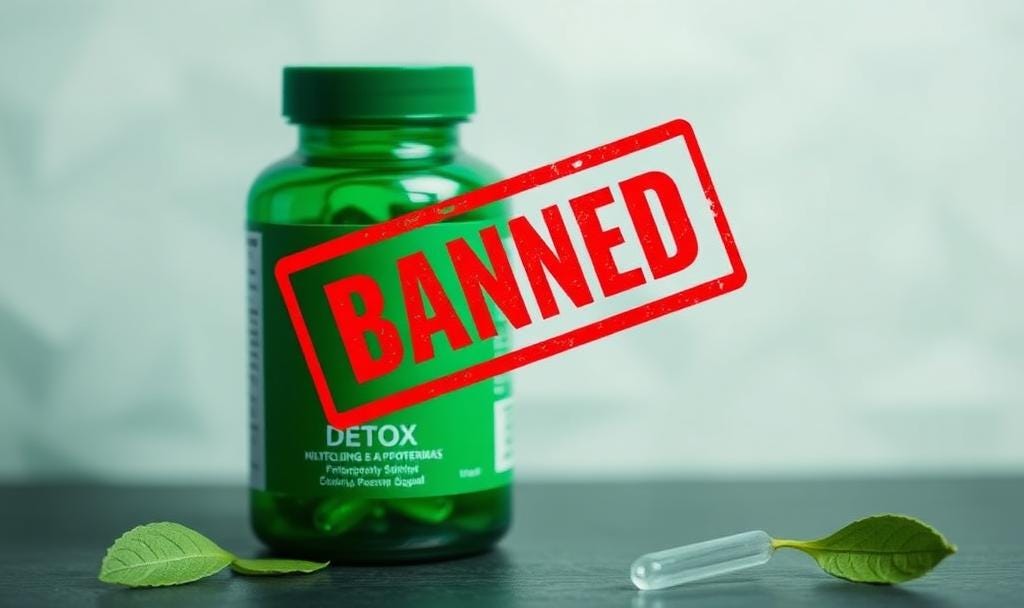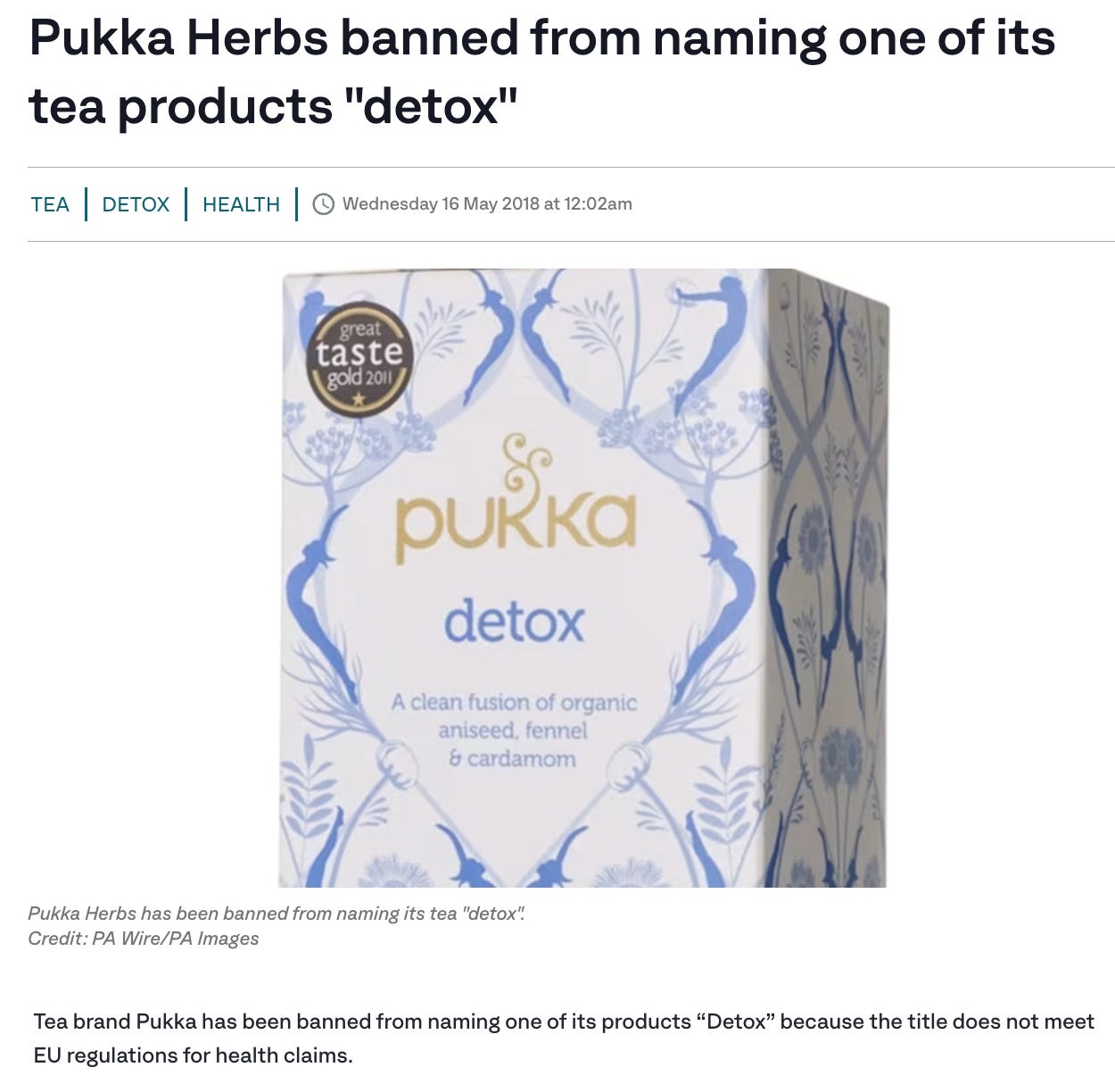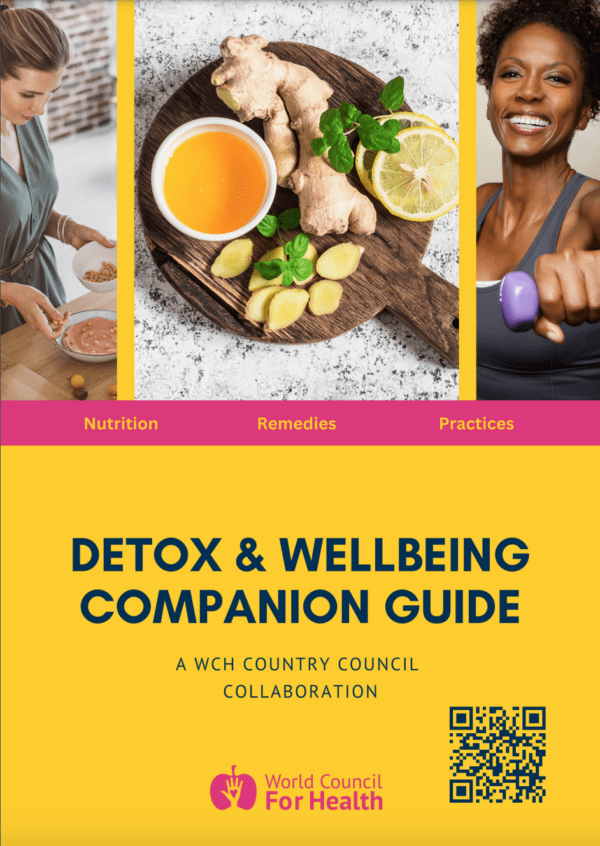The Day Detox Became a Dirty Word
European companies and practitioners aren't allowed to use the words 'detox' or 'detoxification' anymore. Here's why.
If you live in Europe, have you noticed there are almost no detox teas or supplements, on the shelves anymore? It’s not so much that the products have disappeared, but the word ‘detox’ has been wiped from the labels. To understand why, we have to go back almost two decades and the start of what has come to be a wholesale assault on alternative medicine.
The legislation that pledged to protect the public
On 20 December, 2006, the EU passed the Health Claims Regulation (EC) No 1924/2006, based on the Codex Alimentarius (CEX Alimentarius), an international set of standards. Ostensibly, these standards and the EU’s regulation are designed to protect consumer health and ensure fair food trade. However, a closer examination reveals that these regulations stifle alternative medicine, particularly naturopathy, and restrict legitimate discourse around the health benefits of natural substances.
Why this regulation is doing more harm than good
Scientific evidence vs. regulation. While the EU emphasizes that health claims must be substantiated by scientific evidence, there is a growing body of research supporting the efficacy of foods, herbs, and micronutrients in promoting health and detoxification. Why are the regulators so reluctant to acknowledge this? Are they genuinely focused on consumer protection, or do they serve to uphold the interests of mainstream allopathic medicine, sidelining alternative approaches that have been historically used for centuries?
Marginalization of alternative practices. The stringent criteria for health claims marginalize naturopathy and other alternative practices that don’t align with conventional medical paradigms. Practitioners who advocate for holistic and natural remedies are then often dismissed or regulated out of existence. The implications for public health are significant, as individuals seeking alternative care are increasingly left without options that could benefit their well-being.
Impact on free speech. By restricting the language used in health discussions, regulatory bodies may inadvertently suppress valuable information that could empower individuals to take charge of their health. This raises ethical concerns about who gets to decide what constitutes valid health discourse and what narratives are allowed in the public sphere.
Now ‘detox’ is fast disappearing
A year or so ago, it was still possible to visit your local supermarket or health shop and find products that described their function as ‘detox’ or ‘detoxification’. This is becoming increasingly difficult.
So far, claims related to detoxification have generally received unfavorable assessments from the European Food Standards Agency (EFSA), so they have not been authorized for use on food products. EU citizens or businesses using ‘detox’ in marketing or labeling could face legal consequences if they do not comply. This is particularly relevant for businesses that market dietary supplements or food products claiming detox benefits.
The inability to discuss detoxification obstructs informed patient choice and undermines the potential benefits of natural health practices.
What this means for health-promoting medicine
This regulation has led to business closures and court cases. Companies can incur significant fines for so-called misleading advertising or non-compliance with health claims regulations. If a product is deemed in violation of “health claims”, authorities may mandate a recall, which can be very costly. Companies face lawsuits from consumers or regulatory bodies, bringing more financial liabilities and potential damages. In severe cases, companies can be forced to shut down.
Why don’t companies just get their products registered under the EU Health Claim Act? Cost is a huge factor. The costs can range from 20,000 to over 140,0000 euros with additional annual costs of 1,000-5,000 euros. But if you can’t get an apple, time in a sauna, dandelion, zeolite, or chlorella patented, who would spend this amount on top of expensive and time-consuming studies?

It’s not healthy until they say it is
Do you remember the phrase: “an apple a day keeps the doctor away”? In the EU, claiming that "an apple is healthy" is no longer straightforward. Such a claim must be specific and backed by so-called robust scientific evidence, demonstrating clear links between the food and each health benefit. Moreover, any health claim requires pre-approval from the EFSA. Without this rigorous evaluation, such claims cannot legally be used in marketing or labeling.
So despite scientific evidence that apples are healthy due to their rich nutrient profile - which includes dietary fiber, vitamins (especially vitamin C) and various antioxidants - and help reduce chronic disease risk and improve heart and digestive health, it is a crime in Europe to say so.
The Codex Alimentarius and the EU Health Claims regulation may aim to protect consumers, but they’re actually protecting dominant medical narratives by censoring alternative medicine and removing informed choice.
Back to the word ‘detox’. The need to clear our bodies of toxins has never been greater - and yet apparently, we mustn’t speak freely about it. The World Council for Health stands for a better way and supports free speech, free choice and an open minded science. We have a detox guide available to download from our website, and countless articles, videos and interviews on detoxing. Anyone considering a detox strategy is also warmly welcome to join our Detox & Wellbeing study which is now underway.
References
Kelley, D. S., et al. (1995). "Dietary apple fiber lowers serum cholesterol and lipoprotein levels in hypercholesterolemic men." Journal of Nutrition, 125(9), 2325-2330.
Miller, M. J., et al. (2007). "Effects of apple consumption on gut health: a review." Comprehensive Reviews in Food Science and Food Safety, 6(2), 93-101.
Tsao, R. (2010). "Chemistry and health benefits of apple polyphenols." CriticalReviews in Food Science and Nutrition, 50(1), 17-25.
Bickel, M., et al. (2015). "The role of apple consumption in the prevention of chronic diseases: a systematic review." Nutrients, 7(10), 9138-9153.
This systematic review assesses the relationship between apple consumption and chronic disease prevention







I used to think the EU was a good thing, but doubts began to creep in when they went for supplements. As well as the attack on freedom to make our own health decisions (of course, we've learned more recently that it's much worse than that) this is a gravy train for those without conscience but with unlimited greed.
I didn’t know this. I’m wondering what that means when I start marketing the two yearly Ayurvedic cleanses I support people with, and also how I continue to share Ayurveda with my clients, which includes how to avoid a build up of toxins and how to remove what has accumulated. Maybe I use the word remove not detox 🤔